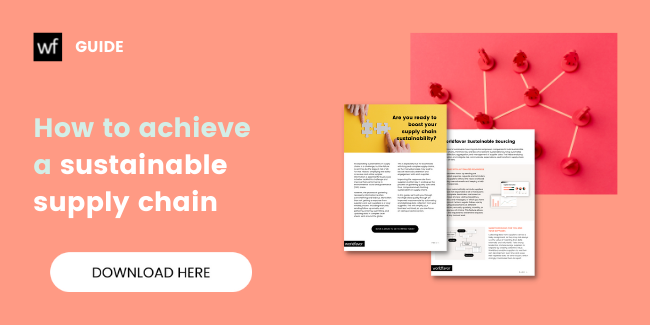6 sources on supply chain mapping to help boost your company's sustainability

What is supply chain mapping?
Supply chain mapping (also known as value chain mapping) is the process of accessing information to understand more about your suppliers and sub-suppliers that make up your value chain. It’s often used to improve visibility downstream, which is especially important as that is where the most severe risks usually are hidden.
Most companies are well aware that the majority of their environmental and social risks are in their supply chain – but uncovering the most hidden threats is not an easy task to take upon. Vulnerabilities in your supply chain can be lurking anywhere, so where do you start?
Based on what we’ve learned over the years, the one thing all organizations should do is map their supply chains.
To help you get started, we have collected some guided articles, webinars, and guides, along with examples of businesses that have aced their supply chain mapping. Let’s have a look:
The Shift Project: How value chain mapping helps companies respect human rights
More than half of those trapped in modern slavery are believed to be in forced or bonded labor. And most of them, about 16 million people, work in some way for the supply chains of international companies. Identifying and acting on these risks is crucial in fighting human rights violations.
The Shift Project is the leading center of expertise on the UN Guiding Principles on Business and Human Rights. In this piece, they lay down the grounds on why mapping is one of the most effective ways to drive action on the most severe human rights challenges a company faces. This article is for you who want to understand supply chain mapping better and find out which are the key elements of effective value chain mapping.
Heineken: Mapping their value chain against the UN SDGs
Being the second largest brewer in the world (largest in Europe) comes with many supply-related challenges. Yet, Heineken has proved that even large international companies can successfully map their value chain. Through its ‘Brew a Better World’ strategy, the Dutch company is mapping its entire value chain ‘from Barley to Bar’ to understand their impacts and how they can improve its sustainability every step of the way.
Wordfavor guide: How to achieve a sustainable supply chain
Over the past few years, more organizations are beginning to see the value of collecting crowd-sourced data from their suppliers to improve the sustainability of their supply chain. However, the process of gathering necessary information is often overwhelming and tedious. More often than not, getting a response from suppliers and sub-suppliers is a longwinded process, including manually sending follow-up emails and gathering, entering, submitting, and updating data in complex Excel sheets sent around the globe.
Worldfavor helps companies unleash the power of crowd-sourced data by automating and digitizing the data collection from their suppliers.
Get your free guide here to learn how to fuel sustainable action through crowd-sourced supplier data.
Unilever: Crowd-sourcing for a more transparent palm oil supply chain
Unilever, which owns Ben & Jerry’s and Dove, among other brands, uses crowd-sourcing technology to increase transparency into its complex palm oil supply chain to ensure a deforestation-free supply chain. Using AI, Unilever connects with local people in Indonesia who help track the palm from the point of origin to processing.
Read about the project here, or watch a short film summarizing their strategy below:
Starting at the source: Sustainability in supply chains by McKinsey
This article addresses the foundation of what supply chain mapping is all about: starting at the source. This read shows – in numbers – how working closely with suppliers, companies can lessen their environmental and social impact and position themselves for strong growth.
Worldfavor webinar: Human rights due diligence in the supply chain
Human rights due diligence is a growing worldwide movement fueled by new legal requirements and recommendations on businesses, such as the OECD, the Norwegian Transparency Act (Åpenhetsloven), Germany´s Supply Chain Due Diligence Act (LkSG), and the French Duty of Vigilance Act, to mention a few. Taking responsibility for human rights impacts across the supply chains is no longer optional. It's a necessary approach. In this on-demand webinar, we will cover the scope of human rights due diligence and discuss how to successfully work with human rights due diligence in global supply chains.
Make mapping easy in Worldfavor
Map your supply chain in Worldfavor – the digital solution that streamlines
the communication between suppliers and buyers and automates analyses to gain insights from the data to be more equipped to take action. Gain visibility on every tier of your supply chain with crowd-sourced data. Trace impact, assess risks, and mitigate them effectively. Book a free demo and allow us to tell you more!
Related blog posts you might like:







%20as%20the%20deadline%20approaches.%20Learn%20about%20compliance%20requirements%2c%20potential%20delays%2c%20and%20key%20updates..png)

